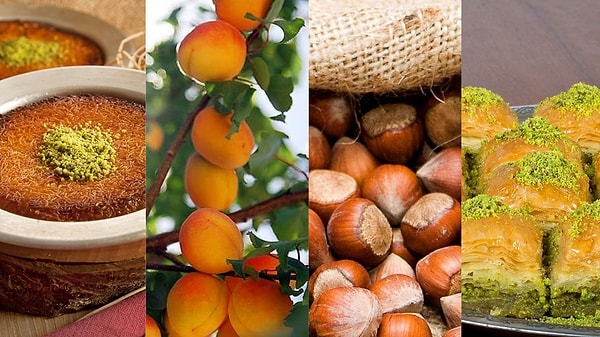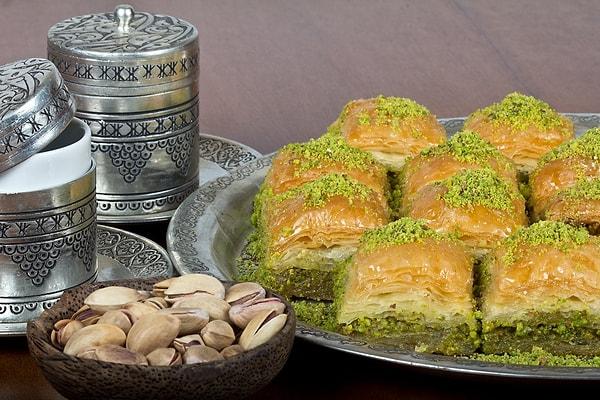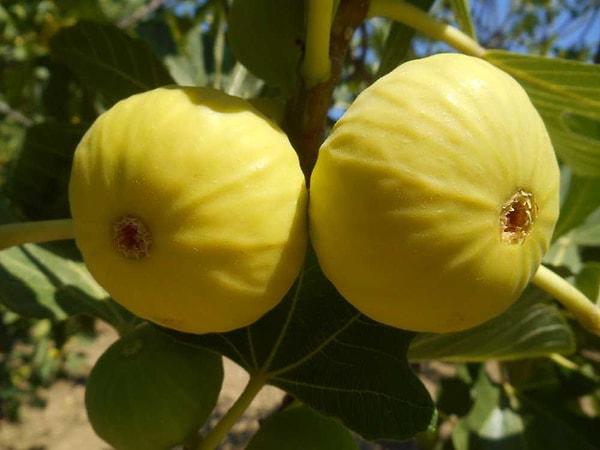Turkey, a country known for its rich cultural heritage and diverse culinary traditions, boasts an impressive array of foods that are deeply woven into the national identity. This richness and diversity are celebrated and protected by the European Union's Protected Designation of Origin (PDO) status awarded to certain traditional Turkish foods. This status not only ensures the preservation of these regional specialties but also guarantees their quality and authenticity. This article takes you on a gastronomic journey through 13 such iconic Turkish foods, from the sweet Gaziantep baklava to the aromatic Edremit olive oil, each with a unique story and a flavour that speaks of the region it hails from.
Turkey's Culinary Heritage: A Journey Through Its 13 EU Protected Foods

1. Gaziantep Baklava

This traditional sweet dish from Gaziantep is a beloved Turkish dessert, revered not only in its homeland but across the world. Gaziantep Baklava is a rich, sweet pastry made of layers of crispy phyllo dough filled with ground pistachios from the region, sweetened with syrup or honey. Its PDO status ensures the preservation of this centuries-old recipe, protecting its authenticity and quality.
2. Aydın Figs

These figs, grown in the Aydın region of Turkey, are known for their large size, high sugar content, and delicate aroma. Known to be among the most delicious and nutritious in the world, they are often eaten fresh but are also used in baking and preserves. Their PDO status guarantees the figs' quality and origin, ensuring that you are tasting the true flavor of Aydın.
3. Aydın Chestnuts
Another renowned product from the Aydın region, these chestnuts are celebrated for their sweet taste and creamy texture. Often candied or roasted, they make for a delightful seasonal delicacy. The PDO status protects the traditional cultivation methods that contribute to their unique quality.
4. Malatya Apricots
Hailing from Malatya, these apricots are recognized globally for their sweet flavor, bright orange color, and plumpness. Often dried and exported worldwide, these apricots are a symbol of the region. Their PDO status ensures the preservation of traditional cultivation and drying techniques that set them apart from other varieties
5. Milas Olive Oil
This high-quality olive oil from the Milas region in the southwest of Turkey is celebrated for its distinctive flavor profile. It ranges from delicate and slightly sweet to more robust and peppery, reflecting the diverse olive cultivars in the region. Its PDO status safeguards the traditional methods of cultivation and extraction.
6. Bayramiç Beyazı
This variety of white wheat from the Bayramiç district in Çanakkale is praised for its resilience and adaptability to the local climate. Its grain is used to produce a high-quality flour, ideal for traditional bread and pastries. Its PDO status acknowledges its historical and cultural significance to the region.
7. Taşköprü Garlic
Grown in the Taşköprü district of Kastamonu, this garlic is famous for its strong flavor and aroma. Considered an essential ingredient in Turkish cuisine, this garlic variety has a unique taste profile that sets it apart. Its PDO status ensures the quality and distinctiveness of this native crop.
8. Giresun Tombul Hazelnut
Produced in Giresun, these hazelnuts are known for their large size and rich flavor. This region is one of Turkey's main hazelnut production areas, and these premium nuts are often enjoyed raw, roasted, or used in confectionery. Their PDO status underscores the importance of traditional cultivation methods and the region's specific soil and climate conditions.
9. Antakya Künefe
This dessert, originating from the Antakya region, is a cheese pastry soaked in sweet syrup and topped with pistachio. This decadent dish is a celebration of textures and flavors – crunchy, creamy, sweet, and salty. The PDO status ensures that the traditional Antakya Künefe recipe is preserved and celebrated.
10. Suruç Pomegranate
Grown in the Suruç region, these pomegranates are famous for their deep red color, sweet and sour flavor, and abundant juice. Often consumed fresh or used in sauces and drinks, these pomegranates represent the region's rich agricultural heritage. Their PDO status ensures protection of the unique characteristics given by the Suruç region's specific terroir.
11. Çağlayancerit Walnut
Known for their thick shells and delicious, oily kernels, the walnuts from the Çağlayancerit district are a popular Turkish delight. They are consumed fresh, used in desserts, or crushed to make oil. The PDO status guarantees their unique qualities and upholds traditional cultivation techniques.
12. Gemlik Olive
Native to the Gemlik area in Bursa, these olives are renowned for their black color, large size, and shiny skin. They are typically cured and enjoyed as a key element in Turkish cuisine, known for their buttery taste and easily removable pits. The PDO status safeguards their quality and distinctive characteristics.
13. Edremit Olive Oil
Produced in the Edremit region, this olive oil is valued for its fruity aroma, light texture, and balanced flavor. The olives are hand-picked and cold-pressed, resulting in an exceptionally pure and high-quality oil. The PDO status protects the traditional production methods that give Edremit olive oil its prized characteristics.
Preserving a Taste of Tradition
Turkey's gastronomy paints a vibrant tapestry of its history, tradition, and cultural diversity. Each of the 13 EU PDO protected foods represents not only a region in Turkey but also the nation's dedication to preserving and promoting its rich culinary heritage. These foods, with their unique tastes and production methods, take us on a sensory journey through Turkey's beautiful landscapes, from the olive groves of Milas to the pomegranate orchards of Suruç. They remind us of the value of traditional farming methods, regional biodiversity, and the skill of generations of farmers and producers. By protecting and celebrating these foods, we ensure that they continue to bring joy and connect us to a place and culture for years to come.
